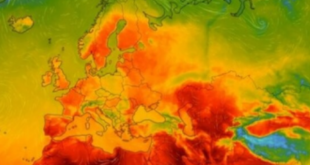Dr. Seema Javed
 Many animals and plants unique to the world’s most stunning natural places face extinction if greenhouse gas emissions continue to rise, according to a new scientific study published in the journal Biological Conservation. However, remaining within the climate goals of the Paris Agreement – which aims to keep global heating well below 2°C, ideally at 1.5°C – would save the majority of species.
Many animals and plants unique to the world’s most stunning natural places face extinction if greenhouse gas emissions continue to rise, according to a new scientific study published in the journal Biological Conservation. However, remaining within the climate goals of the Paris Agreement – which aims to keep global heating well below 2°C, ideally at 1.5°C – would save the majority of species.
A global team of scientists analysed almost 300 biodiversity hotspots – places with exceptionally high numbers of animal and plant species – on land and at sea. Many of these hotspots contain ‘endemic’ species, unique to one geographic location such as one island or one country.
Stella Manes, lead author of the study and a researcher at the Federal University of Rio de Janeiro, said:
“Climate change threatens areas overflowing with species that cannot be found anywhere else in the world. The risk for such species to be lost forever increases more than ten-fold if we miss the goals of the Paris Agreement.”
“Biodiversity has more value than meets the eye. The greater the diversity of species, the greater will nature’s health be. Diversity also protects from threats such as climate change. A healthy nature provides indispensable contributions to people, such as water, food, materials, protection against disasters, recreation, and cultural and spiritual connections.”

Shobha S. Maharaj, island specialist from the Caribbean Environmental Science and Renewable Energy Journal, and author of the study said:
“This study finds extinction risk due to climate change for geographically rare species living on islands to be over eight times higher than on mainland regions. The geographical rarity of these species makes them of global value to nature. Such species cannot move easily to more favourable environments and their extinction could result in disproportionate global species loss.”
They found that if the planet heats by over 3°C then a third of endemic species living on land, and about half of endemic species living in the sea, face extinction. On mountains, 84% of endemic animals and plants face extinction at these temperatures, while on islands that number rises to 100%. Overall, 92% of land-based endemic species and 95% of marine endemics face negative consequences, such as a reduction in numbers, at 3°C. Current policies put the world on track for around 3°C of heating.
Wolfgang Kiessling, marine expert from Friedrich-Alexander University Erlangen-Nürnberg and author of the study, said: “Our study shows that a uniform and likely boring world is ahead of us due to climate change. Introduced species benefit, whereas the species that make hotspots distinctive will be lost.”Endemic species include some of the world’s most iconic animals and plants. Endemic species threatened by climate change include lemurs, which are unique to Madagascar, and the snow leopard, one of the most charismatic animals of the Himalayas. They also include important medical plants such as the lichen Lobaria pindarensis, used to alleviate arthritis.”
The study found that endemic species are 2.7 times more likely to go extinct with unchecked temperature increases than species that are widespread, because they are only found in one place; if climate change alters the habitat where they live, they are gone from the face of the Earth. If greenhouse gas emissions keep rising then places like the Caribbean islands, Madagascar, and Sri Lanka could see most of their endemic plants go extinct as soon as 2050. The tropics are especially vulnerable, with over 60% of tropical endemic species facing extinction due to climate change alone.
Mark Costello, marine expert from Nord University and the University of Auckland and author of the study, said:
“This study finds that geographically rare species, especially those living on islands and mountains, are already threatened with extinction due to present climate change. By nature these species cannot easily move to more favourable environments. The analyses indicate that 20% of all species are threatened with extinction due to climate change in the coming decades, unless we act now.”
But all is not lost. If countries reduce emissions in line with the Paris Agreement then most endemic species will survive. In total, just 2% of endemic land species and 2% of endemic marine species face extinction at 1.5ºC, and 4% of each at 2ºC. Strong commitments from global leaders ahead of the climate change summit in Glasgow later this year could put the world on track to meet the Paris Agreement, and avoid the widespread destruction of some of the world’s greatest natural treasures.
“This study finds extinction risk due to climate change for species found nowhere but islands such as those in the Caribbean, Pacific, South East Asia, Mediterranean or Oceania to be over eight times higher than on mainland regions. The geographical rarity of these species makes them of global value to nature. Such species cannot move easily to more favourable environments and their extinction could result in disproportionate global species loss.” – Shobha S. Maharaj, island specialist from the Caribbean Environmental Science and Renewable Energy Journal.
(AUTOR IS SENIOR JOURNALIST AND ENVIRONMENTALIST)
 Jubilee Post News & Views
Jubilee Post News & Views





